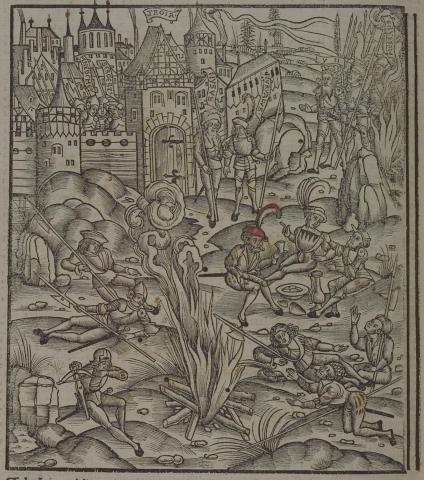Annotations
In the top right, Messapus stands guard with several men, with a fire lit to ensure that the Trojans do not try to attack or escape in the night (159-61). The troops who are not currently on guard duty sit in the Rutulian camp around a central fire a short distance from Troy. Some men eat and drink (157-8), others appear to be playing a gambling game with stones (166-7), one man appears to be preparing his weapons, and two attempt to sleep. From the city of Troy, Mnesthes [Mnesche] and Sergestus, who have been left in charge of the city while Aeneas is away (171-3), direct the final preparations of the city for battle (168-70). Nisus and young Euryalus stand guard at the gate of the city (176-83). Nisus has expressed a desire to catch the Rutulians unaware with a night raid, and Euryalus insists on accompanying him (184-223).
Woodcut illustration from the “Strasbourg Vergil,” edited by Sebastian Brant: Publii Virgilii Maronis Opera cum quinque vulgatis commentariis expolitissimisque figuris atque imaginibus nuper per Sebastianum Brant superadditis (Strasbourg: Johannis Grieninger, 1502), fol. 332v, executed by an anonymous engraver under the direction of Brant.


Sebastian Brant (1458-1521) was a humanist scholar of many competencies. Trained in classics and law at the University of Basel, Brant later lectured in jurisprudence there and practiced law in his native city of Strasbourg. While his satirical poem Das Narrenschiff won him considerable standing as a writer, his role in the transmission of Virgil to the Renaissance was at least as important. In 1502 he and Strasbourg printer Johannes Grüninger produced a major edition of Virgil’s works, along with Donatus’ Life and the commentaries of Servius, Landino, and Calderini, with more than two hundred woodcut illustrations. (Annabel Patterson)